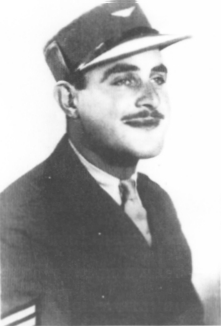 It was around the middle of 1948. I stood under the clock in Euston Station at 4 p.m. with the News of the World in one hand and the Glasgow Herald in the other awaiting my special contact. A voice boomed in my ear: “Are you Michael Coleman?”
It was around the middle of 1948. I stood under the clock in Euston Station at 4 p.m. with the News of the World in one hand and the Glasgow Herald in the other awaiting my special contact. A voice boomed in my ear: “Are you Michael Coleman?”
When he heard my reply, I was told to follow him, and so began the start of my journey to Israel.
I crossed the English Channel to Paris, where I met up with other volunteers and from there to a displaced persons camp near Marseilles called Grand Arénas. There for the first time I came in contact with volunteers from all over the world and also many displaced persons with numbers tattooed on their arms. After a sojourn in the camp, my group flew to Israel. We landed during a truce period. When questioned, we all had our replies ready: working on a kibbutz, studying, and so on. One of our group was an ex-American Army officer, who spoke Hebrew and Arabic. He was destined for army intelligence, but got fed-up with waiting, and took charge of a Yemenite group in the defense of Jerusalem, where he was seriously wounded and blinded. His name was Chaim Blanc and a film was made in tribute to him. While in Israel, I met fellow-Dubliners Solly Cantor and Louis Harris, now residing in the UK. Both served in the army.
As I had some military experience with the local Defense Force in Ireland and the Royal Air Force, I was sent to the fledgling Israel Air Force bomber base. We had three World War II B-17 heavy bombers, which my cousin, a navigator from South Africa, said were well-passed their prime, and he would not let me take part in any raids. However, I did go up on practice runs with an American pilot, and was promised a job as a gunner on the next raid. But that’s another story. At my camp another valuable service was performed: training sessions were established by the pilots for the training of the emerging young and talented members of the Israel Air Force in all aspects of air crew duties. Alas, at 23 I was a bit on the old side.
My main job was as senior NCO in charge of ground defense, i.e. anti-aircraft guns, aircraft and military equipment. I would act as orderly officer on a regular basis, sometimes a few times in a week. I would therefore be responsible for the base security. Due to shortage of experienced personnel in the use of arms, pilots would often guard their own aircraft, and I would drive around the camp in my jeep assigning guards to the various security points. Many of them could not use any weapon at all, and I would have to give last-minute .instructions on how to use a rifle; Sten guns (automatic small machine guns) would only be given to those who knew how to handle them.
My camp was bombed by the Egyptians, and we were unable to open fire as their planes were above the range of our old anti-aircraft guns, and opening fire would have given them our exact position. Nevertheless the nearby kibbutz was bombed and some of its members were killed and injured.
I remember a very sad incident: one of the survivors of the Nazi death camps who served on my base could no longer deal with the horrors he had suffered, and hanged himself. Many others like him were in psychiatric wards in Israel.
When I look back on the history of the time, although six superior Arab armies inflicted a lot of damage and killed so many, Israel not only survived – some say by a miracle – but defeated its enemies. Israel had limited supplies of weapons which only arrived at the last moment, and in many cases were limited in their use.
In conclusion, Israel still has many difficulties to face; not least the giving up of territory, which in my view is highly dangerous. As the Israelis used to say in 1948, give the Arabs one finger and they want the whole hand, then the arm and last the body. While in this respect nothing has changed, we need to support Israel in every way possible.
Author: Michael Coleman
This article appeared in the “Nachlath Dublin Magazine 2008/9”.
Additional note from the author:
On my proposed bombing mission as an auxiliary gunner in a B-17, I was told to draw my parachute and be ready to fly a 3 a.m. (This was an arrangement with the American pilot.) At 1.30 a.m. I was woken up and told that the Arabs were going to attack our camp from the triangle. All aircraft raids were cancelled and I had to put out an extra four manned gunposts on the outskirts of our airfield and carry out the usual anti-aircraft and aircraft inspection. This went on for about five days and no attack took place. Then a truce came into effect, and later another one, but from a practical point, the raids were not resumed in the 1949 period.

